Destructive giant snail intercepted by ‘Beagle Brigade’ at Atlanta airport
ATLANTA - The Atlanta airport’s so-called "Beagle Brigade" found a stash of prohibited items coming in from overseas including a massive invasive snail, which agricultural officials consider among the most destructive.
The Customs and Border Protection’s K9 unit at Hartsfield-Jackson Atlanta International Airport caught the scent coming from luggage coming in from Nigeria on Nov. 8. Inside the suitcase, federal inspectors say a live Giant African Snail was found along with prohibited goat meat, cow skins, melon seeds, and vegetables.
"The amazing Beagle Brigade is a valuable team member of CBP’s agriculture mission protecting our nation from highly invasive pests such as the Giant African Snail," said Clay Thomas, Area Port Director for Customs and Border Protection Atlanta. "This was a significant discovery for our agriculture K9 team—a critical component of our nation’s frontline defense against all animal pests that threaten our agricultural resources."
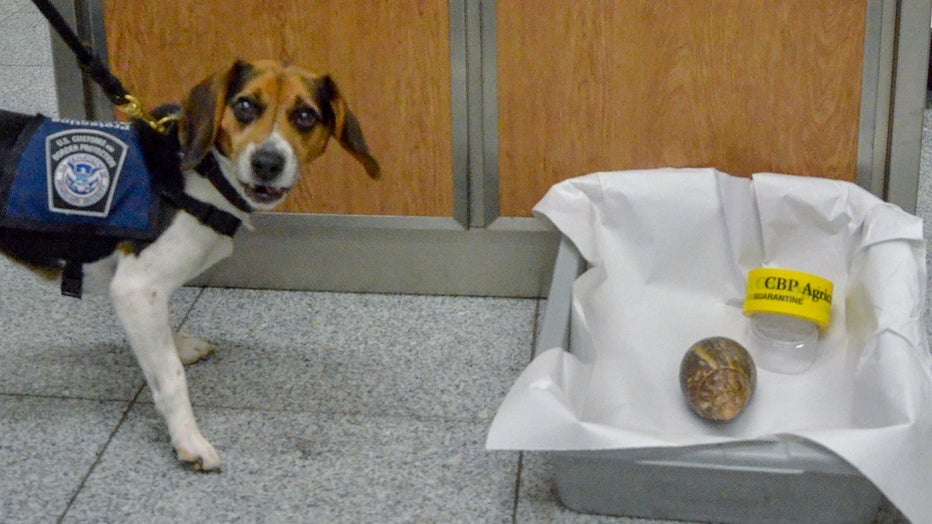
K9 Mox, who is part of the U.S. Customs and Border Protection so-call "Beagle Brigade" at Hartsfield-Jackson Atlanta International Airport sniffed out this live Giant African Snail on Nov. 8, 2022. (Courtesy U.S. Customs and Border Protection)
The prohibited items were seized. The CBP did not say what happened to those items from there, but in the past the items were destroyed. As for the snail, CBP says they tried to find a place for it.
"We worked diligently to find a home for the giant snail, but regrettably had to put it to sleep," said Rob Brisley, Public Affairs, U.S. Customs and Border Protection.
The snail weighed somewhere between a baseball and softball, the CBP says.
"When speaking with this passenger, she wasn’t able to be specific, except she was bringing it from Nigeria to Texas," said Brisley.
The traveler was warned about the carrying of prohibited items and was allowed to continue on to her final destination in Texas.
Brisley says about a trash can full of vegetables, fruits, and other prohibited items are seized each day at Atlanta's airport by CBP officers. He says it is rare to come across a snail like this, but it is not the first time. In 2019, two snails were intercepted at the airport along with prohibited fruit.
International travelers are asked to consulate the CBP’s Know Before You Go website and to always declare any foods when passing through the border.
Why is the Giant African Snail so dangerous?
The U.S. Department of Agriculture describes the Giant African Snail as one of the most damaging snails in the world due to its love of vegetation. It is also one of the world's largest land snails.
The mollusk can consume 500 different types of plants. It also can cause structural damage to plaster and stucco structures, and carries a parasitic nematode that can lead to meningitis in humans.
The snail is particularly hazardous to the agriculture in Florida, Hawaii, and the Caribbean.
"If it got loose, in farms, vegetation, those things just eat around the clock and the damage could be overwhelming," said Brisley.
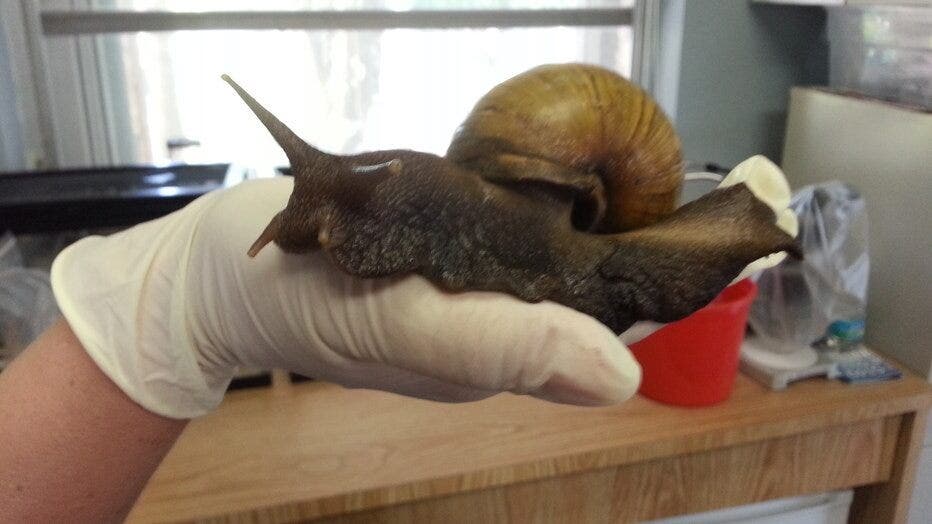
(USDA)
Federal agriculture officials say an invasion in the 1960s in Florida cost $1 million and took 10 years to correct. A second infestation in 2011 in Broward and Miami-Dade counties took another decade to eradicate fully.
This past June, another snail was found in the Tampa Bay area. It measured about 8-inches long.
Each snail has both female and male reproductive organs, so they can reproduce rapidly. It can reproduce several more times after mating once.
They can produce about 1,200 eggs every year.
These types of snails can be used in certain culinary dishes, kept as pets, or traded.
What is the Beagle Brigade at Atlanta’s airport?
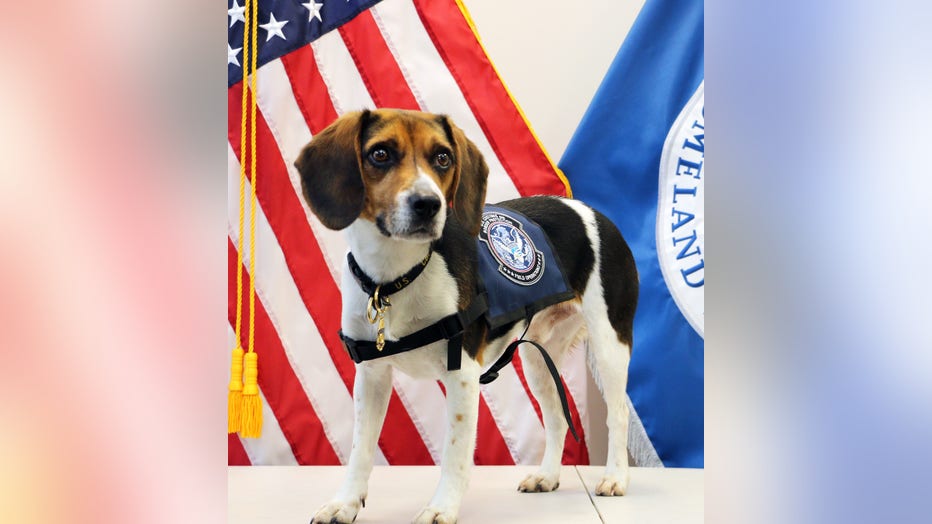
K9 Mox
K9 Mox is being credited with finding the Giant African Snail.
"Mox is one of the handful of beagles on duty at Atlanta and airports across the country," said Brisley. "But the beagle itself, just a wonderful dog, all they want to do is find food."
Many of the dogs in the CBP’s Beagle Brigade are rescues coming from Georgia animal shelters. Some even being rehabilitated after years of abuse.
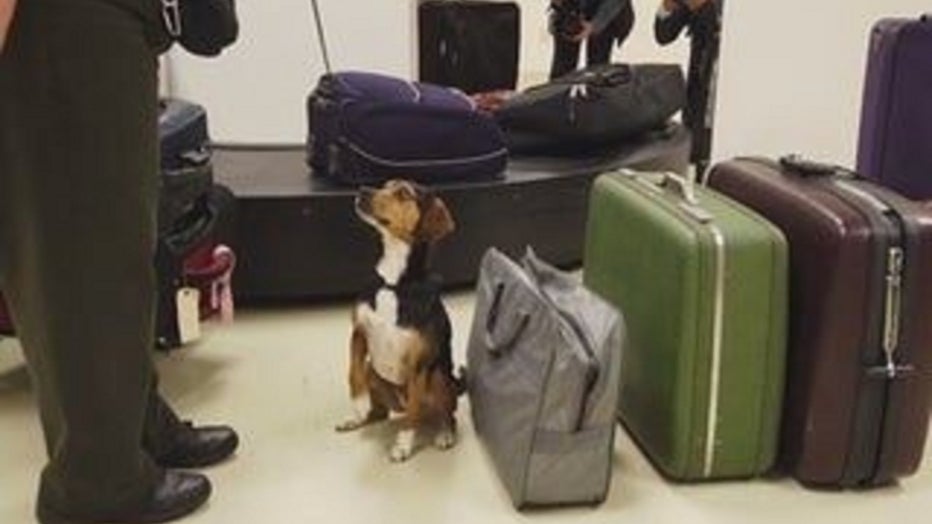
(FOX 5)
The dogs are trained at the National Detector Dog Training Center in Newnan. Mostly beagles, labs and Jack Russell Terriers are trained for the work. The dogs then are deployed to U.S. international airports and on the border at crossings as well as mail and cargo facilities.
The dogs are tasked with looking for mostly apples, citrus, mango, beef, and pork on the prohibited list. One such bust was in 2018 in Atlanta when the Beagle Brigade stopped a traveler from Ecuador carrying a fully-cooked pig.
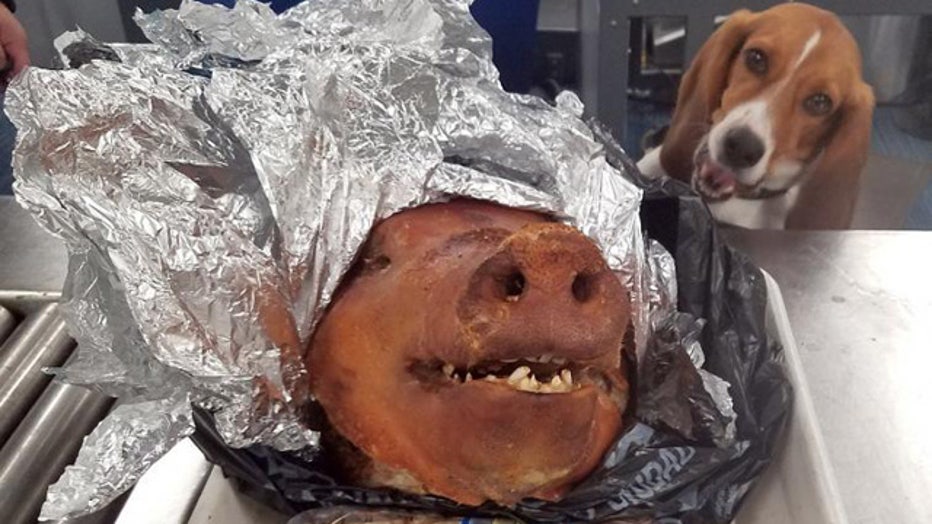
(Courtesy U.S. Customs and Border Protection)
The U.S. prevents any pork and pork products from other continents in order to prevent the introduction of diseases like foot and mouth disease and classical swine fever.
Some of the dogs are trained to detect snakes and then are sent to Hawaii to keep the islands snake-free.
The public can also adopt dogs that don’t make it the program.
FOX 13 contributed to this report

